A Critical Reassessment of Artificial Intelligence’s Promises and Pitfalls
“Rebooting AI: Building Artificial Intelligence We Can Trust” by Gary Marcus and Ernest Davis delivers a much-needed reality check for anyone fascinated by the rapid progress of artificial intelligence. Rather than simply celebrating the achievements of deep learning and data-driven models, Marcus and Davis offer a balanced, insightful critique of where AI stands today and what it will take to make these systems genuinely trustworthy. The authors, both renowned in cognitive science and computer science, argue that the current direction of AI research is fundamentally limited by its lack of true understanding and common sense, and they call for a new approach that places reasoning and reliability at the core of artificial intelligence
Moving Beyond the Hype: The Real Limits of Deep Learning
One of the book’s most compelling themes is the distinction between narrow AI, which excels at specific tasks, and the broader, adaptable intelligence that characterizes human thought. Marcus and Davis point out that while AI has achieved remarkable success in games like chess, Go, and even Jeopardy, these victories are confined to closed systems with well-defined rules. In contrast, the real world is unpredictable and full of nuance, and current AI systems-heavily reliant on deep learning and statistical pattern recognition-often falter when faced with novel situations or incomplete information. The authors caution against the hype that surrounds AI, emphasizing that scaling up data and computation alone will not produce the kind of robust, flexible intelligence that we associate with humans
The Essential Role of Common Sense and Understanding in AI
A major argument in “Rebooting AI” is that genuine artificial intelligence must be able to understand context, reason about cause and effect, and adapt to new situations-abilities that current deep learning systems simply do not possess. Marcus and Davis look to the human mind as inspiration, suggesting that future AI must be grounded in a deep, conceptual understanding of the world, not just the ability to recognize patterns in vast datasets. They critique the field’s overwhelming focus on data-driven approaches and highlight the need for AI that can reason, learn from minimal data, and make sense of ambiguous or incomplete inputs. This shift is critical if we want AI to be truly reliable, especially in high-stakes domains like healthcare, autonomous vehicles, and legal decision-making
Accessible Insights for Experts and General Readers Alike
One of the strengths of this book is its accessibility. Marcus and Davis write in a clear, engaging style that makes complex technical concepts understandable for readers from all backgrounds. Through vivid examples and real-world case studies, they illustrate both the successes and the shortcomings of current AI technologies. The book is thoughtfully structured, guiding readers through the history of AI, the rise of deep learning, and the persistent challenges that remain. Each chapter builds on the last, culminating in a persuasive argument for why the field of AI needs to be “rebooted” with new priorities and methodologies
A Vision for Trustworthy and Ethical Artificial Intelligence
“Rebooting AI” is not just a critique of current methods; it is a call to action for building AI that is trustworthy, ethical, and aligned with human values. The authors stress that as AI systems become increasingly integrated into our daily lives-shaping decisions in healthcare, finance, transportation, and beyond-society must demand transparency, accountability, and fairness from these technologies. Marcus and Davis propose that the next generation of AI should be engineered with values and a deep understanding of human contexts, rather than relying solely on black-box models and statistical correlations. Their vision is for AI that augments human capabilities and serves the public good, rather than simply automating tasks or maximizing efficiency
Essential Reading for Leaders, Policymakers, and Technologists
This book is particularly valuable for business leaders, policymakers, and technologists who are making decisions about the adoption and regulation of AI. Marcus and Davis provide a balanced perspective that acknowledges the impressive progress made in recent years while also highlighting the risks of overreliance on current methods. Their insights help readers distinguish between genuine breakthroughs and overhyped claims, equipping them to make informed choices about where to invest resources and how to shape the future of AI responsibly. The book’s practical recommendations and ethical considerations make it a vital resource for anyone involved in the development, deployment, or oversight of artificial intelligence
A Blueprint for the Next Generation of AI
Ultimately, “Rebooting AI” offers an inspiring and pragmatic vision for what artificial intelligence could become if the field embraces a more holistic, human-centered approach. The authors argue that the real breakthrough will not come from bigger datasets or more powerful neural networks, but from AI that can reason, understand, and interact with the world as humans do. This vision is both ambitious and grounded in the realities of current technology, making the book a hopeful yet realistic guide for the future of AI
Where to Learn More and Get Your Copy
For those interested in exploring these critical issues further, “Rebooting AI: Building Artificial Intelligence We Can Trust” is available at major booksellers and libraries. For additional perspectives and reviews, you can visit Goodreads or watch a concise YouTube summary. Stay tuned for our Amazon affiliate link to purchase your copy and join the important conversation about building a future with trustworthy, ethical, and truly intelligent AI
Conclusion: A Must-Read for the Age of Artificial Intelligence
“Rebooting AI” is a timely, thought-provoking book that challenges both the AI community and the public to rethink what artificial intelligence should be. By exposing the limitations of current approaches and offering a roadmap for more robust, ethical, and trustworthy AI, Marcus and Davis have created an indispensable resource for anyone invested in the future of technology and society


